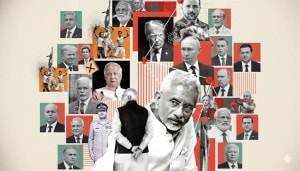French secular fundamentalism
Legislation is proposed in France to forbid signs and dress that conspicuously show the religious affiliation of students. The law will not ...

Legislation is proposed in France to forbid signs and dress that conspicuously show the religious affiliation of students. The law will not be applicable to students in private schools. The justification offered for this law, namely, to preserve secularism, is unconvincing.
Secularism is not anti-God nor anti-religion. The essential elements of secularism are i no State support or patronage for any religion and ii no State interference with the freedom of a person to practise his religion subject to reasonable restrictions on the heads of public order, morality and health.
The Human Rights Committee functioning under the International Covenant on Civil and Political Rights 1966 in its General Comment 22 on Freedom of Religion has expressly stated that practice of religion includes 8216;8216;the wearing of distinctive clothing or head-covering8217;8217;. This right is vital for the minorities in order to preserve their religious and cultural identity. For the Sikhs wearing of turbans is part of their religion and way of life.
There is no reason to restrict students from wearing cultural or religious items so long as these do not impair the learning environment nor affect the quality of education imparted in a school. Obviously that cannot be the case otherwise private schools would not be exempt from this proposed law.
Extending the ban to wearing Jewish skull caps, Sikh turbans and display of Christian crosses is a disingenuous attempt to conceal the true nature of this legislation which is really aimed at Muslim female students wearing their headgear. It is incomprehensible how donning a modest headgear is anti-secular. To perceive 8216;8216;something aggressive8217;8217; in the wearing of headscarves by Muslim girls and to regard these as 8216;8216;ostentatious signs of religious proselytism8217;8217;, as President Chirac said in his recent speech in Tunis, smacks of secular fundamentalism.
This will needlessly foment religious and ideological divide and impart a feeling of insecurity to religious minorities. The proposed measure is a retrograde step and the French government would do well not to enact it into law.
Prostitutes and discrimination
The constitutionality of the Sexual Offences Act 1957 in South Africa was challenged by three female prostitutes on the ground of gender discrimination because according to them female prostitutes alone were prosecuted.
The Constitutional Court of South Africa by a majority rejected the challenge. It held that a gender neutral provision which operates in a legal framework that punishes both the customer and the supplier of services cannot be said to be discriminatory on the basis of gender because of the practice of the police and the prosecutors to prosecute only the female prostitutes and not their male customers. The majority ruled that such a practice points to a flaw in the application of the law but does not render the law unconstitutional.
The minority, of which Justice Albie Sachs was a member, dissented on this score. It noted the accepted position that 8216;8216;the effect of the provision fell disproportionately on women8217;8217;. It ruled that 8216;8216;the effect of making the prostitute the primary offender directly reinforces a pattern of sexual stereotyping which is itself in conflict with the principle of gender equality. The differential impact between the prostitute and the client is therefore directly linked to a pattern of gender disadvantage8217;8217;.
According to the minority judgment the consequence is indirect gender discrimination. This reasoning accords with our Supreme Court judgments which have laid down that it is not the object of the legislation but its practical effect on a guaranteed fundamental right which is material in deciding the constitutionality of a statute.
The minority judgment reflects a realistic and commendable approach so essential to combat the all pervasive evil of indirect gender discrimination.
Guilty of pornography
In ordinary mortals guilt follows wrongdoing. Psychoanalysts assure us that a persistent feeling of guilt leads to complexes and strange behaviour patterns. The confessional in the Catholic Church whatever spiritual benefits it confers has certainly therapeutic value. At times public confession of guilt accompanied by remorse partially satisfies the victim of wrongdoing. That was the rationale of the Truth and Reconciliation Commission set up in South Africa in relation to crimes committed during the apartheid regime.
Shlomo Eliahu, chief rabbi in Safed had a deluge of queries from Orthodox Jews who were bothered because they had succumbed to the lure of porno websites. The rabbi rose to the occasion and composed a prayer to help them. 8216;8216;Please God, help me cleanse the computer of viruses and evil photographs which disturb and ruin my work8230; so that I shall be able to cleanse myself of sin.8217;8217; The rabbi recommends that Jews recite the prayer when they log on to the internet. If our urban teenagers follow the rabbi8217;s advice they would be constantly praying and that too for the wrong reasons.
- 01
- 02
- 03
- 04
- 05































